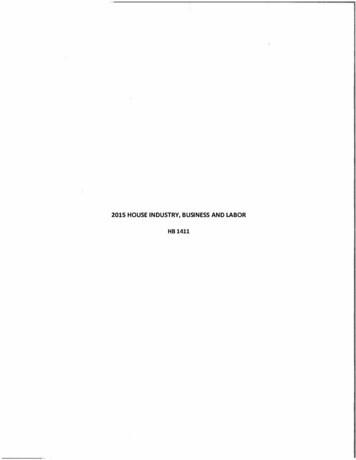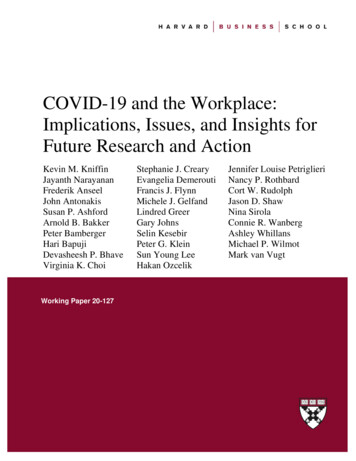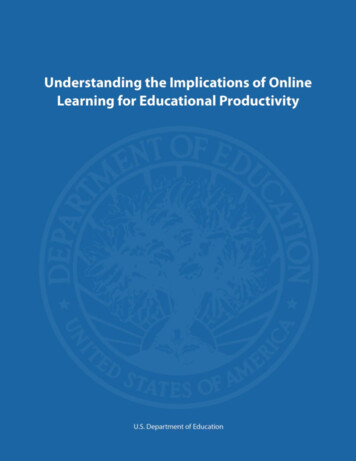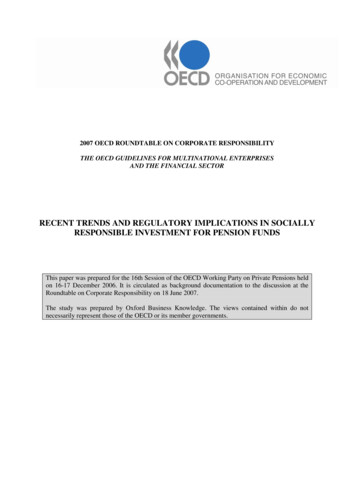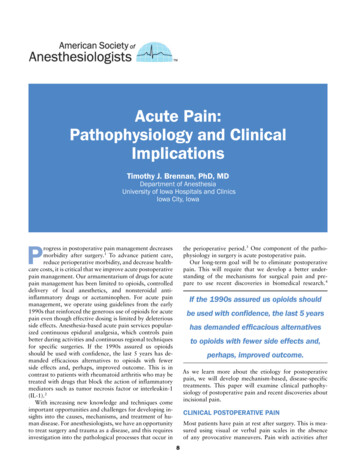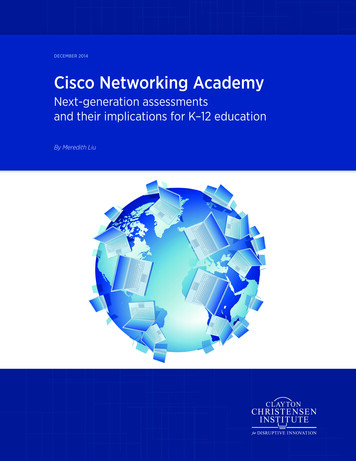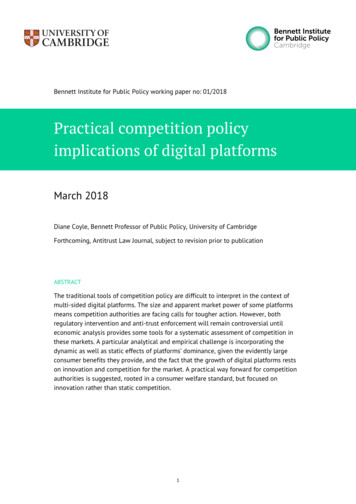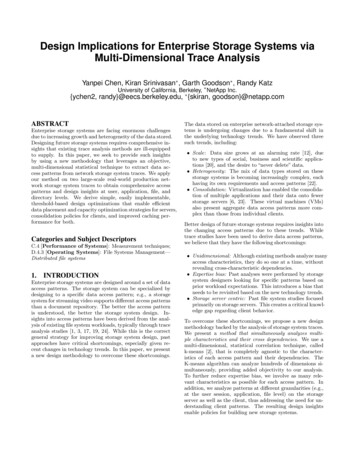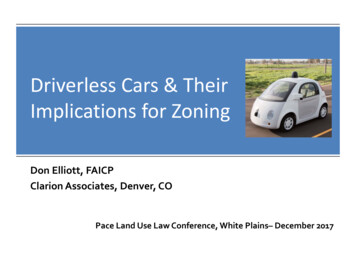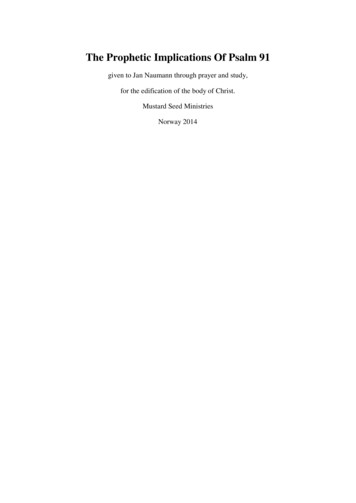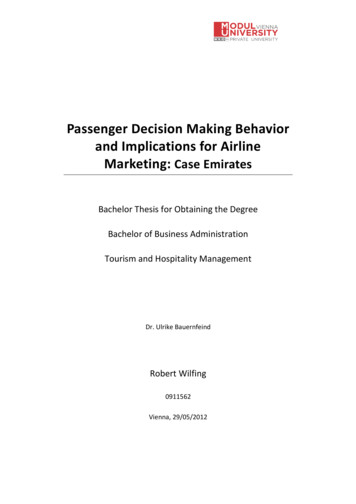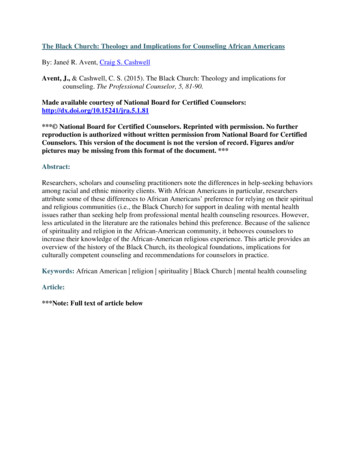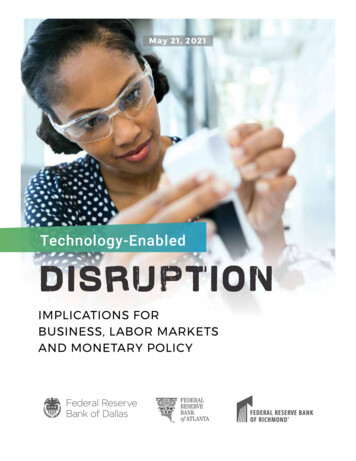
Transcription
M ay 21 , 20 21Technology-EnabledIMPLICATIONS FORBUSINESS, LABOR MARKETSAND MONETARY POLICYFederal ReserveBank of Dallas
This conference is designed to provide athe muted wage gains and overall labor produc-better understanding of the phenomenontivity growth we have seen in the U.S. as well asof technology-enabled disruption and explore itsin other advanced economies during much ofimplications for the broader economy—in par-the recovery from the global financial crisis.ticular, labor markets and the workforce.Technology-enabled disruption’s impact onTechnology-enabled disruption means thatthe workforce is likely not susceptible to mone-workers are increasingly being replaced bytary policy—it requires structural reforms. Thetechnology. It also means that existing businessreforms could include improving early-child-models are being supplanted by new models,hood literacy and overall college readiness inoften technology-enabled, that bring more effi-order to increase the percentage of students whociency to the sale or distribution of goods andgraduate from college in six years or less (a shareservices. As part of this phenomenon, consum-now estimated at 59 percent in the U.S.). The re-ers are increasingly able to use technology toforms could also include stepped-up efforts toshop for goods and services at lower prices withincrease middle-skills training in cities acrossgreater convenience—which has the impact ofthe U.S. in order to increase employment, closereducing the pricing power of businesses. Thisthe skills gap (not enough workers to fill skilledreduced pricing power, in turn, causes business-jobs) and raise worker productivity.es to further intensify their focus on creatingIt is also likely that disruption is a factorgreater operational efficiencies. These trendsbehind some business decisions made by com-appear to be accelerating.panies that are facing one or more disruptiveIt is likely that disruption is becoming acompetitors. These companies may be moregreater factor in the economic outcomes ofcautious about making capacity-expansion de-workers. Increasingly, workers with lower lev-cisions and investing in major capital projects.els of educational attainment are seeing theirTo deal with disruptive changes and lack ofjobs restructured or eliminated. Unless theypricing power, many companies are seekinghave sufficient math and literacy skills, or aregreater economies of scale in order to main-retrained, these workers may see their pro-tain or improve profit margins. This may helpductivity and incomes decline as a result ofexplain the record merger-and-acquisition ac-disruption. Thus, disruption may help explaintivity globally over the past few years.2TECHNOLOGY–ENABLED DISRUPTION CONFERENCE
A G E N D A May 21, 20218:15 a.m.James BessenBoston University School of LawIntroduction andOpening RemarksDiane CoyleBennett Institute for Public Policy,University of CambridgeRobert S. KaplanFederal Reserve Bank of DallasMark A. WynneFederal Reserve Bank of Dallas8:30 a.m.Willy ShihHarvard Business SchoolCatherine TuckerMIT Sloan11:00 a.m.Technology-EnabledDisruption— A ConversationBreakModerator: Robert S. Kaplan11:15 a.m.Nitin NohriaHarvard Business SchoolRoss Perot Jr.The Perot Group and HillwoodSteven WilliamsPepsiCo Foods North AmericaPolicymaker RoundtableModerator: Kathleen HaysBloombergThomas I. BarkinFederal Reserve Bank of Richmond9:30 a.m.Raphael BosticFederal Reserve Bank of AtlantaThe Economics ofTechnological ChangeRobert S. KaplanChair: Kartik AthreyaFederal Reserve Bank of Richmond3TECHNOLOGY–ENABLED DISRUPTION CONFERENCE
A G E N D A May 21, 202112:30 p.m.3:00 p.m.BreakBreak1:00 p.m.3:05 p.m.The Future of Work:Framing the DebateDirections for Future ResearchChair: Marc P. GiannoniFederal Reserve Bank of DallasJoseph FullerHarvard Business SchoolChair: Karel MertensFederal Reserve Bank of DallasKartik AthreyaMarc P. GiannoniPaula TkacFederal Reserve Bank of Atlanta1:45 p.m.The Future of Work:Preparing the Workforceof the FutureChair: Pia OrreniusFederal Reserve Bank of DallasTamar JacobyOpportunity America3:55 p.m.Concluding RemarksRobert S. KaplanMark A. Wynne4:00 p.m.Joe MayDallas CollegeAdjournWilliam SerrataEl Paso Community College4TECHNOLOGY–ENABLED DISRUPTION CONFERENCE
SPEAKER BIOSKartik AthreyaExecutive Vice President and Director of ResearchFederal Reserve Bank of RichmondAthreya is executive vice president and director of research at the Federal Reserve Bankof Richmond.His work has been published in a variety of academic journals, including the Journal of Monetary Economics, American Economic Journal: Macroeconomics and International EconomicReview. He is also an associate editor at the Journal of Economic Dynamics and Control andthe author of Big Ideas in Macroeconomics.Recently, Athreya taught a doctoral course in macroeconomics at the University of Virginia.Athreya earned a PhD in economics from the University of Iowa.5TECHNOLOGY–ENABLED DISRUPTION CONFERENCE
SPEAKER BIOSThomas I. BarkinPresident and CEOFederal Reserve Bank of RichmondBarkin is president and CEO of the Federal Reserve Bank of Richmond. He joined the Richmond Fed in January 2018.He is responsible for the Bank’s monetary policy, bank supervision and regulation, andpayment services, as well as oversight of the Federal Reserve System’s information technology organization. Barkin also serves on the Federal Reserve’s chief monetary policy body, theFederal Open Market Committee.Prior to joining the Richmond Fed, Barkin was a senior partner and chief risk officer atMcKinsey and Co., a worldwide management consulting firm, and he previously served as theorganization’s chief financial officer. He also served on the board of directors for the FederalReserve Bank of Atlanta from 2009 to 2014 and was the board’s chairman from 2013 to 2014.Barkin has held leadership roles with organizations that include the Metro Atlanta Chamberof Commerce, the Atlanta Committee for Progress, the Commerce Club and the EmoryUniversity Board of Trustees.He earned undergraduate, MBA and law degrees from Harvard University.6TECHNOLOGY–ENABLED DISRUPTION CONFERENCE
SPEAKER BIOSJames BessenEconomist and Executive Director, Technology & Policy Research InitiativeBoston University School of LawBessen, an economist, serves as executive director of the Technology & Policy ResearchInitiative at the Boston University School of Law. He has also been an innovator and CEO ofa software company. He has done research on the impacts of automation, how informationtechnology has contributed to rising industry concentration, whether patents promoteinnovation, and how technology affects jobs, skills and wages.With Michael J. Meurer, Bessen wrote Patent Failure, which highlights the problems causedby poorly defined property rights. Bessen’s book, Learning by Doing: The Real ConnectionBetween Innovation, Wages and Wealth, looks at history to understand how new technologiesaffect wages and skills today.Bessen’s work has been widely cited in the press as well as by the U.S. White House andSupreme Court, the European Parliament and the Federal Trade Commission.7TECHNOLOGY–ENABLED DISRUPTION CONFERENCE
SPEAKER BIOSRaphael BosticPresident and CEOFederal Reserve Bank of AtlantaBostic became the 15th president and CEO of the Federal Reserve Bank of Atlanta in June2017. He is a participant on the Federal Open Market Committee, the monetary policymakingbody of the Federal Reserve System.From 2012 to 2017, Bostic was the Judith and John Bedrosian Chair in Governance andthe Public Enterprise at the Sol Price School of Public Policy at the University of SouthernCalifornia (USC).He also served USC’s Lusk Center for Real Estate as the interim associate director from 2007to 2009 and as the interim director from 2015 to 2016. From 2016 to 2017, he was the chair ofthe center’s Governance, Management and Policy Process Department.From 2009 to 2012, Bostic was the assistant secretary for policy development and research atthe U.S. Department of Housing and Urban Development (HUD).Bostic worked at the Federal Reserve Board of Governors from 1995 to 2001. He served asspecial assistant to HUD’s assistant secretary of policy development and research in 1999. Hewas also a professional lecturer at American University in 1998.He has previously served on many boards and advisory committees.Bostic graduated from Harvard University with a combined major in economics andpsychology. He holds a doctorate in economics from Stanford University.8TECHNOLOGY–ENABLED DISRUPTION CONFERENCE
SPEAKER BIOSDiane CoyleCo-director, Bennett Institute for Public PolicyBennett Professor of Public PolicyCambridge UniversityCoyle is the Bennett Professor of Public Policy at the University of Cambridge, where sheco-directs the Bennett Institute and its research on progress and productivity. She has been agovernment adviser on economic policy, including throughout the COVID-19 pandemic.Her latest book, Markets, State and People–Economics for Public Policy, examines how societies reach decisions about the use and allocation of economic resources. Her other booksinclude GDP: A Brief But Affectionate History; The Economics of Enough; The Soulful Science;Sex, Drugs and Economics; Paradoxes of Prosperity; Governing the World Economy; and TheWeightless World.She is also a director of the Productivity Institute, a fellow of the Office for National Statistics, an expert adviser to the National Infrastructure Commission and Senior IndependentMember of the Economic and Social Research Council. She has served in public service rolesincluding as vice chair of the BBC Trust, member of the Competition Commission, of theMigration Advisory Committee and of the Natural Capital Committee.Coyle was professor of economics at the University of Manchester until March 2018 and wasawarded a CBE for her contribution to the public understanding of economics in the 2018New Year Honours.She is a graduate of Oxford University and holds a PhD in economics from Harvard University.9TECHNOLOGY–ENABLED DISRUPTION CONFERENCE
SPEAKER BIOSJoseph FullerProfessor of Management Practice in General ManagementHarvard Business SchoolFuller is a professor of management practice in general management at Harvard BusinessSchool and co-leads the school’s initiative, Managing the Future of Work.His research has probed the “skills gap” and investigates the paradox that many employershave chronic difficulty filling jobs while millions of Americans remain unemployed, underemployed or have left the workforce. His current research focuses on the future of workmore broadly, including mechanisms employers can use to address the skills gap and theimplications of changing demographics and the growth of the gig economy for companies.He also currently teaches the Becoming a General Manager course in the second year of theMBA program.He was a founder and first employee of the global consulting firm, Monitor Group, nowMonitor-Deloitte. During his three decades in consulting, Fuller worked with seniorexecutives and policymakers on a wide variety of issues related to corporate strategy andnational competitiveness. He has particularly deep experience in industries with a heavyreliance on technology.Fuller is a graduate of Harvard College.10TECHNOLOGY–ENABLED DISRUPTION CONFERENCE
SPEAKER BIOSMarc P. GiannoniSenior Vice President and Director of ResearchFederal Reserve Bank of DallasGiannoni is senior vice president and director of research at the Dallas Fed. He joined theBank in September 2017.Giannoni previously was research economist and assistant vice president in the macroeconomic and monetary studies function of the Federal Reserve Bank of New York. He is anative of Switzerland and began his career as an economist with the Swiss National Bank inZurich in 1992.He joined the New York Fed as an economist in 2000 before leaving to begin an academiccareer at the Columbia University Graduate School of Business. He rejoined the New YorkFed in 2011 while continuing as an adjunct professor of finance and economics at Columbia.He holds BA and MA degrees in economics from the University of Geneva in Switzerland andMA and PhD degrees in economics from Princeton University.11TECHNOLOGY–ENABLED DISRUPTION CONFERENCE
SPEAKER BIOSKathleen HaysGlobal Economics and Policy EditorBloomberg Television and RadioHays is global economics and policy editor for Bloomberg Television and Radio, coveringeconomies and central banks around the world, from the Federal Reserve and the EuropeanCentral Bank to the Bank of Japan and the People’s Bank of China.She can be seen and heard on “Bloomberg Daybreak: Asia” and “Bloomberg Asia Markets”and on Bloomberg Radio’s “Bloomberg Markets P.M.” She has covered the U.S. economy andthe Federal Reserve for more than 30 years. For the past two years, she has broadened hercoverage to include the economies and central banks of Asia.Hays joined Bloomberg in 2006 after years as an on-air and online economics correspondent at CNBC and CNN, where she served as a host, correspondent and commentator fornumerous programs. She began her career as the New York bureau chief at Markets NewsInternational, a financial news service. From there, she joined Reuters and later worked as aneconomics correspondent and New York bureau chief for Investor’s Business Daily.She attended Stanford University, where she earned a bachelor’s degree and master’sdegree in economics.12TECHNOLOGY–ENABLED DISRUPTION CONFERENCE
SPEAKER BIOSTamar JacobyPresident and CEOOpportunity AmericaJacoby is president of Opportunity America, a Washington-based nonprofit working to promote economic mobility—work, skills, careers, ownership and entrepreneurship for poor andworking Americans. Before founding Opportunity America, she was president of the nonprofitadvocacy group, ImmigrationWorks USA.A former journalist and author, she was a senior writer and justice editor at Newsweek and,before that, the deputy editor of The New York Times op-ed page. She is the author of SomeoneElse’s House: America’s Unfinished Struggle for Integration. Her edited volumes includeReinventing the Melting Pot: The New Immigrants and What It Means to Be American and“This Way Up: New Thinking About Poverty and Economic Mobility.”Jacoby holds a BA from Yale University.13TECHNOLOGY–ENABLED DISRUPTION CONFERENCE
SPEAKER BIOSRobert S. KaplanPresident and CEOFederal Reserve Bank of DallasKaplan has served as president and CEO of the Federal Reserve Bank of Dallas sinceSeptember 2015. He represents the Eleventh Federal Reserve District on the Federal OpenMarket Committee in the formulation of U.S. monetary policy and oversees the 1,300employees of the Dallas Fed.He was previously the Martin Marshall Professor of Management Practice and a seniorassociate dean at Harvard Business School. Prior to joining Harvard in 2006, Kaplan wasvice chairman of Goldman Sachs Group Inc. He is the author of several books on leadershipand management.Kaplan serves as co-chairman of Project A.L.S. and co-chairman of the Draper RichardsKaplan Foundation, a global venture philanthropy firm that invests in developing nonprofitenterprises dedicated to addressing social issues. He is also a board member of HarvardMedical School.Kaplan holds a bachelor’s degree in business administration from the University of Kansasand an MBA from Harvard Business School.14TECHNOLOGY–ENABLED DISRUPTION CONFERENCE
SPEAKER BIOSJoe MayChancellorDallas CollegeMay has served seven years as chancellor of Dallas College, previously known as DallasCounty Community College District. Under his leadership, the college is taking responsibilityfor many issues, including regional workforce needs, growth of minority-owned businesses,the negative impacts of income disparity and providing opportunity equality. He led theconsolidation of seven separate colleges into a single institution.Because of his commitment to diversity, equity and inclusion, May serves as the foundingpresident of Rebuilding America’s Middle Class (RAMC), a national consortium of community colleges.He strongly believes in collaborative efforts and has worked closely with public school districts, sponsored charter schools, career academies, early college high schools and P-TECHhigh schools.May previously served as president of the Louisiana Community and Technical CollegeSystem, presid ent for the Colorado Community College System, and Pueblo CommunityCollege president before accepting the system’s CEO position. He also served in leadershiproles at Sul Ross State University in Alpine, Texas; Navarro College in Corsicana, Texas; andVernon College in Vernon, Texas.He holds a Bachelor of Science and a Master of Education from Stephen F. Austin State University. He earned his doctorate in education from Texas A&M–Commerce.15TECHNOLOGY–ENABLED DISRUPTION CONFERENCE
SPEAKER BIOSKarel MertensSenior Economic Policy AdvisorFederal Reserve Bank of DallasMertens joined the Federal Reserve Bank of Dallas as senior economic policy advisor inJune 2017.His research interests include business cycles, fiscal policy, banking and monetary economics, empirical macroeconomics and time series econometrics. His recent work focuses on themacroeconomic effects of fiscal and credit policies.Prior to joining the Bank, Mertens was an associate professor of economics at Cornell University, and he previously served as the editor-in-chief of The B.E. Journal of Macroeconomics. He is a research fellow at the Center of Economic Policy Research and a former researchassociate at the National Bureau of Economic Research.Mertens is a native of Belgium and holds a licentiaat in economics from Ghent University, anMSc in economics from the London School of Economics and a PhD in economics from theEuropean University Institute.16TECHNOLOGY–ENABLED DISRUPTION CONFERENCE
SPEAKER BIOSNitin NohriaDistinguished Service ProfessorHarvard Business SchoolNohria is Distinguished Service Professor at Harvard Business School. He served as the10th dean of Harvard Business School from 2010 to 2020. He previously served as co-chairof the Leadership Initiative, senior associate dean of faculty development, and head ofthe Organizational Behavior Unit. His intellectual interests center on human motivation,leadership, corporate transformation and accountability, and sustainable economic andhuman performance.He is co-author or co-editor of 16 books. He is also the author of over 50 journal articles, bookchapters, cases, working papers and notes. He has served as an adviser and consultant toseveral large and small companies in different parts of the world. He has been interviewed byABC, CNN and NPR, and cited in Business Week, The Economist, Financial Times, Fortune,The New York Times and The Wall Street Journal.Nohria holds a B. Tech. in chemical engineering from the Indian Institute of Technology,Bombay (which honored him as a distinguished alumnus in 2007). He received his PhD inmanagement from the Sloan School of Management, Massachusetts Institute of Technology.17TECHNOLOGY–ENABLED DISRUPTION CONFERENCE
SPEAKER BIOSPia OrreniusVice President and Senior EconomistFederal Reserve Bank of DallasOrrenius is a labor economist working on regional economic growth and demographicchange. She manages the regional and microeconomics group in the Dallas Fed ResearchDepartment, is executive editor of the quarterly publication Southwest Economy and co-edited Ten Gallon Economy: Sizing Up Economic Growth in Texas. Her academic research focuseson the labor market impacts of immigration, unauthorized immigration and U.S. immigrationpolicy. She is co-author of the book Beside the Golden Door: U.S. Immigration Reform in a NewEra of Globalization.Orrenius is affiliated with several academic institutions. She is research fellow at the TowerCenter for Public Policy and International Affairs and the Mission Foods Texas–MexicoCenter at Southern Me
Robert S. Kaplan Federal Reserve Bank of Dallas Mark A. Wynne Federal Reserve Bank of Dallas 8:30 a.m. Technology-Enabled Disruption— A Conversation Moderator: Robert S. Kaplan Nitin Nohria Harvard Business School Ross Perot Jr. The Perot Group and Hillwood Steven Williams PepsiCo Foods N
